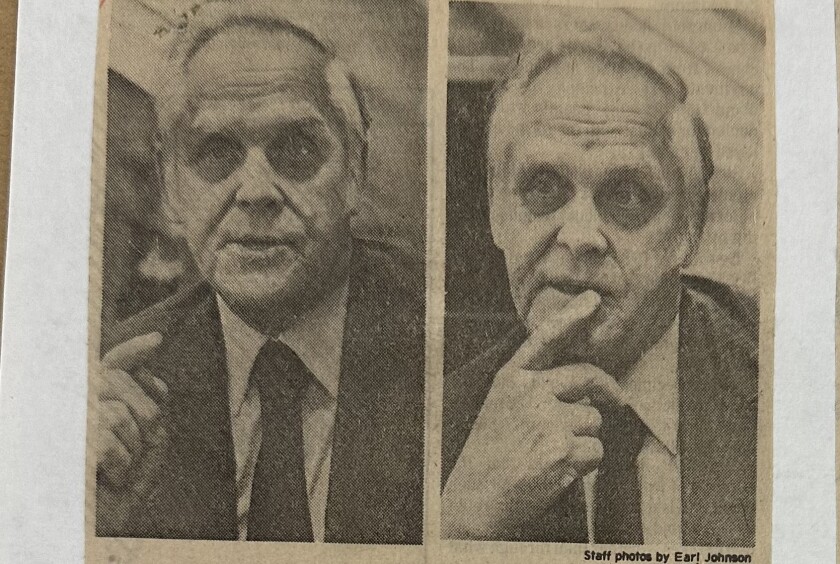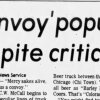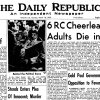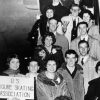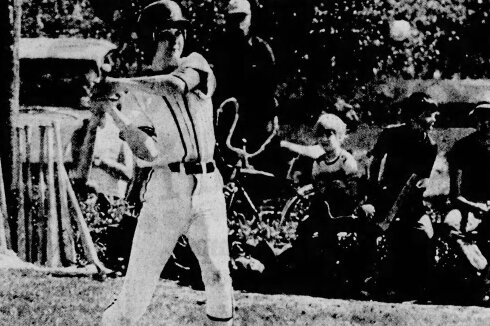CHERRY, Minn. — Convinced an Arabian horse imported from Poland to an Iron Range farm was being bred to generate money for the Communist Party USA, the FBI spent much of the 1960s tracking the stallion and its owners.
FBI documents from that era — some digitized and others released to individuals and newspapers in the past and either not yet digitized or easily accessible online but cited in past coverage — detail a yearslong FBI surveillance campaign by federal officials operating under the assumption that Communist Party USA Secretary General Gus Hall, a Cherry, Minnesota, native, was a silent partner in his brother's horse breeding operation.
ADVERTISEMENT
It also shows the extent to which the FBI, under its longtime director J. Edgar Hoover, would go to investigate communists, even using an apparent informant in the Duluth News Tribune's newsroom.
The FBI had long been watching Hall when the horse drama unfolded in the 1960s.
Born in Cherry in 1910 as Arvo Kustaa Halberg to Finnish immigrants (he changed his name to Gus Hall in the 1930s while organizing steelworkers in Ohio), Hall in 1951 was among the communists facing five years in prison under the Smith Act for advocating or teaching the overthrow of the U.S. government. After initially fleeing to Mexico, he served the sentence, but the U.S. Supreme Court overturned convictions under the Smith Act in 1957.
By 1959, he took his post as general secretary of the Communist Party USA, or CPUSA, a position he held until he died in 2000.
Documents from Operation Solo, the FBI's infiltration into CPUSA, begin to mention Arabian stallions in 1961, noting Hall wanted them for his brothers.
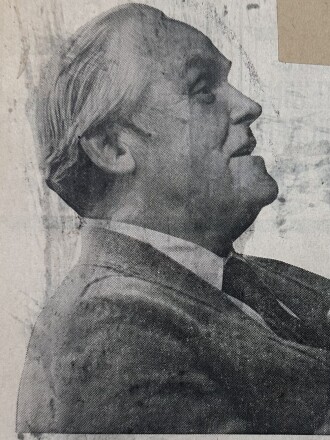
Besides a Cherry horse farm, Hall's brothers, Toivo and Veikko Halberg (later "Hallberg"), had a construction company and a general store. The two were "entrepreneurial spirits," wrote Finnish reporter Tuomas Savonen. Savonen spent 15 years studying Hall and said the FBI's monitoring of the horses was a "crazy story." A chapter of his 2020 doctoral dissertation on Hall examines the Arabian horse saga.
"According to Operation Solo documents, the aim of Hall’s horse deals was to make money for the CPUSA," Savonen wrote. "However, in Solo documents available for this study there was no indications that the party would have received any money from Hall’s horse farmer brothers."
ADVERTISEMENT
Savonen wrote that in 1961, Hall suggested to Morris Childs, an informant at the FBI, that communists in Poland would donate an Arabian stallion to CPUSA, but Childs opposed the plan and wrote to his brother, Jack, also an informant, that if he were to bring up Hall's request for Polish horses, he'd be "laughed at."
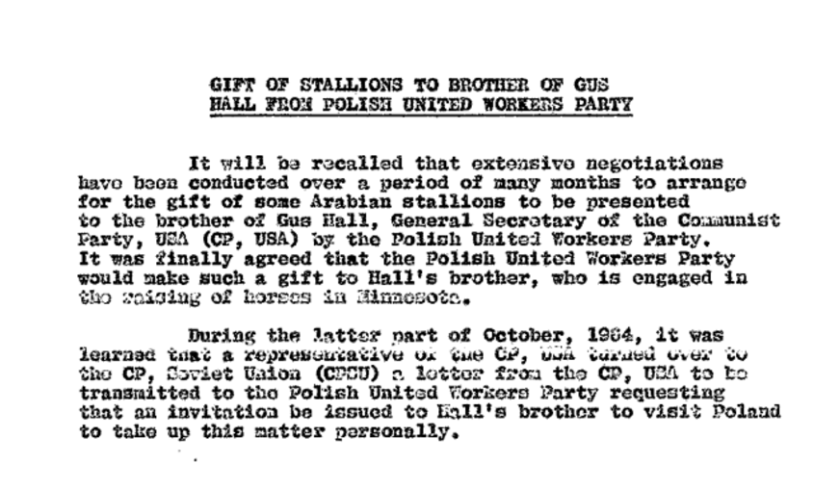
The Polish stallion plan is referenced throughout the Operation Solo documents, but acquiring a horse and transporting it back to Cherry was repeatedly delayed thanks to U.S. tax laws.
In 1966, Toivo traveled to Warsaw, Poland, with Isadore Needleman, a communist lawyer and FBI informant, to negotiate the purchase of the horse. It would still be another two years until the horse arrived in Cherry and more than three years until the FBI gave up on trying to prove that the stallion's stud fees were funneled to the CPUSA.
Savonen, who also published a book in Finnish about Hall called "Moskovan mies vakoilun verkossa" ("Moscow's Man Entangled in Espionage"), in 2023 told the News Tribune earlier this fall that the horse episode shows that Hall wanted to help his brothers out financially.
"I'm not sure they were ever proper communists, but most likely to some extent, they agreed with his horse politics," Savonen told the News Tribune.
However, the FBI, convinced that the Halberg brothers were funding the CPUSA with the money earned from breeding fees and that Hall was a silent partner in the endeavor, weren't fans of these horse politics.
Sabotage through sterilization
To describe the FBI's attempt to sabotage any breeding plan that may have financially benefited CPUSA, Savonen relied on, among other sources, FBI documents obtained by Toivo's son and Gus Hall's nephew, Dennis Hallberg, the former Lakehead Constructors owner who later led Lake Superior Warehousing Co., which operates warehouses in the Port of Duluth-Superior.
ADVERTISEMENT
Those documents, obtained by Dennis through the Freedom of Information Act, detailed plans by the FBI to sterilize the horse when it arrived in the U.S.
The FBI sought to intercept the horse when it passed through the Government Quarantine Station in Clifton, New Jersey. It studied injecting the horse with female hormones, subjecting it to high levels of radiation, and crushing or tying the spermatic cords of the horse.
But getting a veterinarian to perform such tasks covertly would be risky, and the FBI headquarters ultimately scuttled the plan.
"The Bureau has also considered the possibility of artificially causing the stallions to develop a disease which will cause their indefinite quarantine or require their return to Poland upon their arrival in this country," the FBI headquarters wrote in a memo, according to Savonen's dissertation.
FBI-News Tribune collusion?
Once in Minnesota, the horse, Madrygal, wasn't a secret, but his communist origins were. At least for a decade or so.
Longtime reporter Walter Eldot and photographer Karl Jaros visited the Halberg's Cherry farm for a Cosmopolitan section cover story in the March 12, 1967, edition of the Duluth Sunday News-Tribune.
Madrygal arrived 10 months prior and had already won grand champion Arabian stallion at the Minnesota State Fair and several other horse shows.
ADVERTISEMENT
"Hardly a weekend passes, winter or summer, without visitors coming to look at his horses," Eldot wrote. "Many travel long distances."
Toivo did not disclose the price of the horse but noted he traveled to Poland — his first time on an airplane — to inspect and "hand pick" a horse. The article did not mention Toivo's brother Gus Hall or the Communist Party.
For over a decade, aside from a few classified advertisements selling descendants of Madrygal, that was that.
Then, on Nov. 24, 1977, the second story in a series by Knight-Ridder Newspapers, which owned the News-Tribune and Herald, on recently-released FBI documents detailed the federal law enforcement agency's surveillance of the horse.
The article said FBI documents revealed a "strong informant" at the News-Tribune who vowed to keep the FBI updated on the horses' arrival. But later memos said Madrygal had arrived and that the newspaper informant hadn't been contacted, and a later memo said the March 12, 1967, News-Tribune article "exposed" the horse, according to the article, even though it did not mention Gus Hall.
The informant at the News-Tribune was not named.
Eldot, now a copy editor for the paper, said he was not the informant and said he “stumbled” across the story when he drove by the Halberg property.
ADVERTISEMENT
In a statement, Thomas Daly, editor of the Duluth Herald and News-Tribune, said he did not know of the newspaper’s cooperation with the FBI.
“My first reaction to the saga of the Polish stallion is one of bemusement. Unfortunately, the ludicrous situation not withstanding, these revelations are unsettling. The credibility of the press suffers and this is really all the journalist has going for him,” Daly said in 1977.
“I have no knowledge at this time as to whether anyone now at these newspapers have compromised themselves in this manner,” Daly said. “If I had evidence to this effect, the person would, of course, be discharged."
A few days later, the Minneapolis Tribune on Nov. 27, 1977, published its version of the story. It said the FBI documents "strongly suggested" the News-Tribune's March 12, 1967, story on the Halbergs' horse was a "favor to the FBI." The article claimed that memos said the FBI had a close association with News-Tribune managing editor Jack Fein, who died in 1974.
"This story was released following a contact with the managing editor of this newspaper, a cooperative news source," the memo, written by the FBI agent in charge of its Minneapolis office, said, according to the Minneapolis Tribune.
According to FBI memos cited in the Minneapolis Tribune story, the FBI had hoped to damage CPUSA by planting a story suggesting the revenue generated from the stallion's reproduction was funding the Communist Party, but plans were thrown off by the "good 'cover' story," presumably Eldot's March 1967 article, that made no mention of Hall or CPUSA.
Then, in 1968, another setback for the FBI. Madrygal was sold to someone in Louisville, Kentucky.
ADVERTISEMENT
While the FBI continued searching for possible connections between the new owner and CPUSA, Hoover, the FBI's longtime director, ultimately stopped the inquiry. In an Oct. 1, 1969, memo, he wrote that "since exposure of this matter might jeopardize a sensitive operation, no further action should be taken at this time" and any Madrygal-to-CPUSA funding would be pretty thin, having only "a very minor effect on party funds."
The Minneapolis Tribune did reach Toivo, who told them the FBI was only interested in the issue because he was Gus Hall's brother and that Hall was "a politician, not a horseman."
"They think up any wild story," he said of the FBI.



